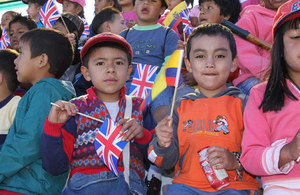A Football series: Dr Matthew Brown last blog
Something else to talk about? Reflections on the 2014 Brazil FIFA World Cup, viewed from Quito

Photo: Andrea Durán
The 2014 FIFA World Cup provided my principal topic of conversation for a month during the tournament, in addition to the year-long build-up and the conferences, workshops, cafe/pub-speculation and social media nonsense that became part of my daily life. In Quito, for me the World Cup was a natural way of opening conversations with taxi drivers, security guards, street cleaners, passers-by and others for whom an Englishman’s natural conversational gambit - the weather - tends only to elicit monosyllabic responses.
For a month, the question of national identity, agonised reflections on failures and successes of the Ecuadorian team, allegations of incompetence and corruption in the governing football federation became central to these conversations. (The most common allegation that I heard was that players were sometimes picked for the national side so that the directors of their teams could share the profits from any international sales resulting from the global shop-window that is the World Cup. I don’t have any hard evidence to support these claims, though I have heard a lot of people make them). The recent sale of Enner Valencia to West Ham United has elicited some pride, though it had also triggered many laments at what Ecuadorian players might achieve if only an effective national system of scouting and coaching could be implemented - Valencia only started playing in the highest level in Ecuador in his early twenties, and his rise in the last 18 months, via a top-scoring spell at Pachuca in Mexico, has been meteoric.
This is nothing new. On 15 April 1928, ‘La Nacion’ lamented that:
Football, for us, is a struggle, which we are are building on very weak and disconnected foundations: we lack coaches and rely only on what nature has provided, and the gifts of the players themselves
The semi-final between Brazil and Germany was the game of the tournament. I made a mess of watching it. Calculating that it would likely go to extra-time like many of the quarter-finals, I decided to work through the first half at the Biblioteca Nacional, reading the fascinating pages of El Tiempo, a Quito newspaper, from 1900. Before long I realised that it seemed like the radio announcer, whose words could initially be heard seeping through the library partition walls, had been screaming gooooollll for almost forty-five minutes.
When I confirmed what was going on I peeled off my face mask and surgical gloves, apologetically returned the bound leather volume to the archivist, and dashed home via the good offices of a taxi driver who had also miscalculated and planned to be home for extra time.
The final was the other side of the coin. We spent the weekend at Bellavista, a marvellous cloud forest retreat hosting hummingbirds and the olinguito, a recently identified species. I therefore settled down for the match with a curious grouping of Ecuadorian bird watching guides and lodge administrators, a Danish family of tourists, and a German bird watcher with a bus to catch at half time. England and Ecuador supported Argentina, the Danes, Germany.
As the second half petered towards the inevitable extra time, several of us went outside to play football as the hummingbirds looked on, bemused. With ten minutes to go of the match in the maracana an enthusiastic boot propelled the ball deep into the forest. We returned to the screen in time to watch Mario Goetze’s delightful goal. In the end everyone agreed that the best team had won.
The World Cup is over. I continue with my historical research into the origins of modern sports in Ecuador between 1880 and 1920. I have found some marvelous sources which have contradicted most of the assumptions I had about the subject before I came. This is certainly a good thing. I have learned a lot about attitudes to bull-fighting and public violence, and how these attitudes were shaped by the virulent political disagreements, revolutions and rebellions that run through this period of Ecuadorian history. I have immersed myself in the sources of the Company of Jesus, the Jesuits, whose many pupils in Quito and Riobamba were playing football at school in the 1910s, and possibly before.
On the morning of writing this blog, I had a long conversation with Rene, who used to work as a tourist guide in Tena (in the Ecuadorean Oriente, in the Amazonian basin). Rene believes that football is the opiate of the people, that it diverts public attention away from much more important matters. Two years ago, road-building in the rainforest had restricted and eliminated much of the biodiversity of the region, meaning that his tourists no longer saw any wildlife. He therefore returned to work in Quito as a taxi driver, infuriated by the sacrifices of natural resources - animals, plants, ecosystems - which are being made in the name of oil, wealth and expansion. For an hour, stuck in an eternal traffic jam caused by a three car pile up on the Avenida Occidental, Rene and I debated the pros and cons of oil expansion into the Ecuadorian Amazon, and particularly the Yasuni National Park.
How, we asked, can people coming from outside feel that they have the right to exterminate the biodiversity of this region, with which those who have lived there for generations have learned how to coexist? But how could the government of a country beset by inequality and poverty NOT give in to the promises of wealth offered by the oil industry? As we parted, Rene and I agreed that prospects for the survival of all the species that live in the rainforest do not look strong. We didn’t talk about football at all.
Dr Matthew Brown is Reader in Latin American Studies at the University of Bristol, and author of “From Frontiers to Football: An Alternative History of Latin America since 1800” (Reaktion, 2014). @mateobrown.